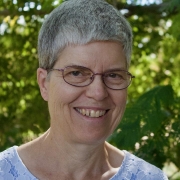Ruth Striegel (NM-IPL Board Co-Chair) Testifies at EPA Hearing
Methane in our atmosphere intensifies the greenhouse effect, and gives us more and more catastrophic weather events like floods, droughts, and hurricanes. Yet oil and gas operators fail to see the connection between this and their leaky equipment that allows methane to escape, or their practice of venting methane. They harm their neighbors but refuse to see the evidence…I urge you to use the tools and technology available to cut methane pollution by 65 percent of 2012 levels by 2025. There is no time to lose. We must act quickly and decisively.
 My name is Ruth Striegel. I live in Albuquerque, NM and I am the Advocacy chair for New Mexico Interfaith Power and Light. I’m a mother, a church music director, and a retired school orchestra teacher.
My name is Ruth Striegel. I live in Albuquerque, NM and I am the Advocacy chair for New Mexico Interfaith Power and Light. I’m a mother, a church music director, and a retired school orchestra teacher.
Human life is totally dependent on the health of this planet. We are part of a vastly complex web of interdependence among the animate and inanimate, oceans, land and climate systems. Within my lifetime, we have come crashing in, with only minimal understanding, taking resources and lives with impunity and creating havoc in our planetary systems. The more I understand about this, the more I fear for our future and the angrier I become at those who knew this would happen, but went ahead and put profit before the health of all of us.
Here in New Mexico we are living through a deep and prolonged drought. Because human activity has weakened the jet stream, we have persistent high pressure systems parked over us, resulting in terrible heat and weeks to months without rain. Our Rio Grande is down to a trickle. All this is caused by human activities that emit greenhouse gases, with methane as the most powerful and dangerous one.
The Golden Rule, common to all faith traditions, states that you should not do to your neighbor what is harmful to you. This is basic to human community. But it seems that our definition of who is our neighbor is far too narrow. When emitted into the air, methane is enormously harmful. People and animals living nearby suffer health effects from breathing methane. Methane in our atmosphere intensifies the greenhouse effect, and gives us more and more catastrophic weather events like floods, droughts, and hurricanes. Yet oil and gas operators fail to see the connection between this and their leaky equipment that allows methane to escape, or their practice of venting methane. They harm their neighbors but refuse to see the evidence.
In southeast New Mexico, we have a fracking oil boom in the Permian basin. Operators there are interested in bringing oil to market. The methane that is emitted as part of their operations is not of interest to them, so they allow it to leak, or they vent or flare it. They say that it’s too expensive to collect the gas and bring it to market. But the true cost in human lives and in climate change is much greater than the cost of capturing the gas. People living in the Permian, as well as our Navajo neighbors living near Chaco Canyon in northwest NM and in gas producing areas of San Juan County, have elevated levels of asthma and cancer. Many live within a mile of oil and gas production sites and have to live with constant noise and light pollution. Their children are growing up in these conditions! We would not put up with this in our own neighborhoods. Yet we’ve violated the Golden Rule and allowed this to go on in our neighbors’ backyards.
For better or worse, the New Mexico economy has long been dependent on tax income from extractive industries. As a retired public school teacher, I can tell you that this income funds our schools, but there is never enough funding to cover all the needs. So beyond the health and climate implications of venting and leaking methane, there’s the fact that we are losing a great deal of tax income that would fund our schools when methane is not captured and sent to market.
I urge you to use the tools and technology available to cut methane pollution by 65 percent of 2012 levels by 2025. There is no time to lose. We must act quickly and decisively. Thank you.
